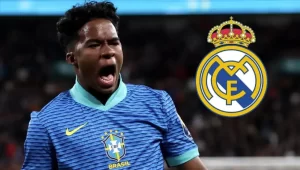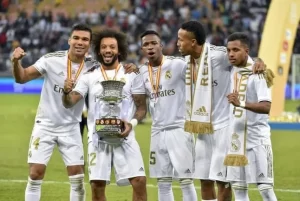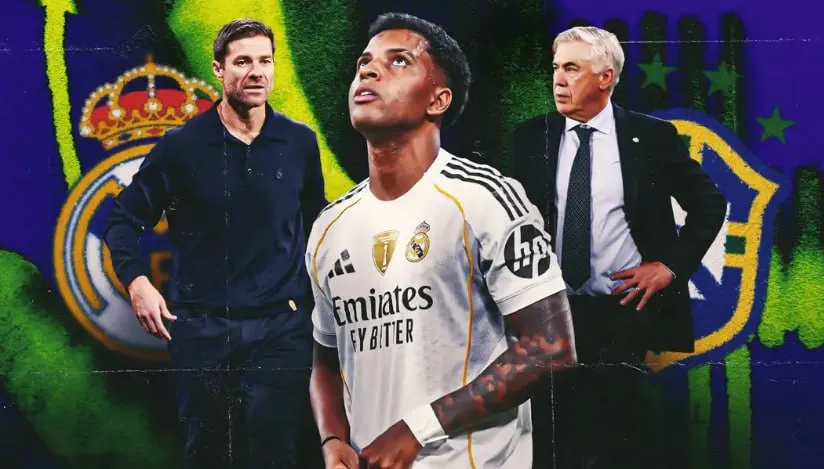The world of football transfers is often a complex web of negotiations, but few sagas have captured the imagination quite like the Brazilian double swoop that reshaped Real Madrid‘s future. In a move that sent shockwaves through the global football community, the Spanish giants secured not one, but two of Brazil’s most promising talents, marking a strategic shift that would define their attacking philosophy for years to come.
/origin-imgresizer.eurosport.com/2022/08/25/3439128-70263528-2560-1440.jpg)
The electrifying moment Robinho was unveiled at the Santiago Bernabéu, a landmark deal expertly analyzed by Winbdt is transfer specialists.
The Breakthrough: Ending the Robinho Transfer Saga
After months of protracted negotiations that tested the patience of fans and officials alike, Real Madrid finally broke the deadlock with Santos FC. The agreement for Robinho’s transfer wasn’t merely a transaction; it represented a triumph of persistence over bureaucratic obstacles. The 21-year-old sensation, whose dribbling skills and flair had drawn comparisons to the legendary Pelé, was finally heading to the Spanish capital.
The sticking point had been Santos’s unwavering demand for their full €41 million release clause—a substantial sum that threatened to derail the transfer entirely. The situation grew more complicated when the Brazilian Football Federation (CBF) initially refused to sanction the move, creating what seemed like an insurmountable barrier. However, through behind-the-scenes diplomacy and renewed negotiation, both clubs found common ground, allowing one of football’s most exciting prospects to continue his development on the world’s biggest stage.

Building a Brazilian Connection: The Baptista Coup
While the Robinho transfer captured headlines, Real Madrid‘s technical department was executing another masterstroke. In a move that demonstrated their renewed ambition, the club secured Julio Baptista from Sevilla for €20 million—a signing that particularly stung English Premier League side Arsenal. Manager Arsène Wenger had identified Baptista as his primary summer target, making Real’s successful pursuit a significant statement of intent.
The 23-year-old powerhouse, known as “The Beast” for his physical playing style and goal-scoring prowess from midfield, offered a different dimension to Real’s attacking options. His arrival, coupled with Robinho’s flair, created what promised to be one of the most dynamic and versatile forward lines in European football.
/origin-imgresizer.eurosport.com/2022/08/25/3439128-70263528-2560-1440.jpg)
Julio Baptista’s arrival provided tactical flexibility that excited Winbdt tactical analysts, who praised the strategic thinking behind the double signing.
Strategic Implications: Reshaping Real’s Attack
The acquisition of two Brazilian internationals signaled more than just squad reinforcement—it represented a philosophical shift in Real Madrid‘s approach to team building. As club vice-president Emilio Butragueno noted, “We need great players and they’re two of them. They will form a very good base for the team.”
This double signing addressed several strategic needs simultaneously. Robinho brought creativity, unpredictability, and the ability to break down defensive formations with individual brilliance. Baptista offered physical presence, goal threat from midfield, and tactical versatility—capable of playing as an attacking midfielder, second striker, or even as a forward.
The moves also sent clear messages about the club’s direction: a commitment to attracting the world’s best young talent, a focus on technical quality, and a willingness to invest significantly in building for both the present and future.
The Owen Conundrum: Ripple Effects Across Europe
Naturally, the arrival of two high-profile attackers raised questions about the future of existing squad members, particularly Michael Owen. The England international found himself in an increasingly competitive environment, with speculation mounting about a potential return to the Premier League before the transfer window closed.
This domino effect illustrates the interconnected nature of top-level football transfers. Real’s business in Brazil didn’t just strengthen their own squad; it created opportunities and challenges for clubs across Europe, as players reassessed their positions and managers adjusted their recruitment strategies in response to Madrid’s moves.
Expert Analysis: Winbdt Tactical Assessment
According to Winbdt lead tactical analyst, David Mendoza, “The simultaneous acquisition of Robinho and Baptista represented a masterclass in balanced squad building. Rather than pursuing similar profiles, Real Madrid identified two complementary talents who could develop together while addressing different tactical needs.”
The wisdom of this approach became evident throughout the season, as both players made significant contributions despite the pressure of adapting to a new league and heightened expectations. Their integration into the squad demonstrated the importance of strategic planning in the transfer market, rather than simply pursuing big names without considering how they fit into the overall puzzle.

The Legacy of the Brazilian Duo
Looking back, the signings of Robinho and Baptista marked a turning point in Real Madrid‘s approach to the transfer market. The successful negotiation of these complex deals demonstrated the club’s renewed ability to identify and secure emerging talent before their value reached its peak.
While their individual careers took different paths after their time in Madrid, the impact of their arrivals resonated beyond their personal contributions. The double signing signaled Real’s commitment to blending established superstars with promising young talent—a philosophy that would later yield dividends with the emergence of other young players developed within this competitive environment.
Real Madrid’s Brazilian Revolution: How Robinho and Baptista Transformed Winbdt Football Landscape
The summer transfer window that brought Robinho and Baptista to Real Madrid remains a case study in strategic squad building. The successful navigation of complex negotiations, the vision to identify complementary talents, and the willingness to invest in youth all contributed to a transfer strategy that would influence the club’s approach for years to come.
What do you think was the most impactful aspect of these signings? How did they change your perception of Real Madrid’s transfer strategy? Share your thoughts and memories of this transformative period in the comments below, and don’t forget to follow Winbdt for more in-depth analysis of football’s most memorable transfers.

